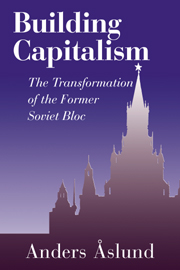Book contents
- Frontmatter
- Contents
- List of Tables and Charts
- Acknowledgments
- List of Abbreviations
- Introduction
- 1 What Communism Actually Was
- 2 The Decline and Fall of Socialism
- 3 Strategic Policy Choices
- 4 Changes in Output and Their Causes
- 5 Liberalization
- 6 Financial Stabilization
- 7 Privatization
- 8 Social Developments and Policy
- 9 State and Politics in the Transformation
- 10 Role of the Outside World
- 11 Conclusions
- Bibliography
- Index
6 - Financial Stabilization
Published online by Cambridge University Press: 15 September 2009
- Frontmatter
- Contents
- List of Tables and Charts
- Acknowledgments
- List of Abbreviations
- Introduction
- 1 What Communism Actually Was
- 2 The Decline and Fall of Socialism
- 3 Strategic Policy Choices
- 4 Changes in Output and Their Causes
- 5 Liberalization
- 6 Financial Stabilization
- 7 Privatization
- 8 Social Developments and Policy
- 9 State and Politics in the Transformation
- 10 Role of the Outside World
- 11 Conclusions
- Bibliography
- Index
Summary
A well-functioning market economy requires reasonable price stability, but almost all transition countries started off with skyrocketing prices, unleashed by price liberalization in the presence of huge excess demand. Monetary expansion had been out of control for some time, and the very institutions of macroeconomic policy were feeble or missing.
The old socialist system had aspired to financial balance, but this was no priority, and inflation was primarily checked through price controls. Capitalism required a different institutional setup, transferring economic policymaking from the Central Committee of the Communist Party, the State Planning Committee, and industrial ministries to the Ministry of Finance and the Central Bank.
The key macroeconomic task was fiscal adjustment. Huge public expenditures and budget deficits had to be reduced. Large public outlays went to rents, and they rendered rent seekers richer and more powerful. An exaggerated fear of collapsing state revenues prevailed while the main problem was that both state receipts and tax rates were too high. Ironically, countries that maintained high tax rates and undertook little early fiscal adjustment saw their public incomes fall the most.
Initially, monetary policy was little understood and therefore loose, allowing rent seekers to thrive on cheap state credits. After a few years, people had learned about the harmful effects of a loose monetary policy, and independent central banks had been formed while the rents from high inflation had been dissipated. Therefore, monetary policy became firm in almost all transition countries, though a poor bank system caused troubles.
- Type
- Chapter
- Information
- Building CapitalismThe Transformation of the Former Soviet Bloc, pp. 197 - 254Publisher: Cambridge University PressPrint publication year: 2001



